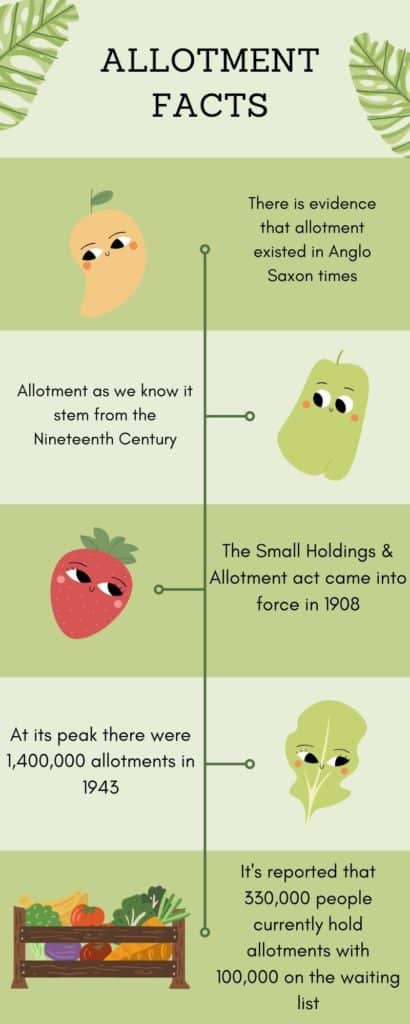Table of Contents
Allotment Life Facts
People are drawn to allotments for a variety of reasons: the fresh air, the exercise, and the opportunity to grow their own food. But what do you really know about allotments? So, here are 5 allotment life facts about these unique pieces of land!
What is an allotment
An allotment is a plot of land that is rented out by local councils or organisations for people to use for gardening. Allotments are usually issued on a first-come, first-served basis, and there may be a waiting list. Each allotment holder is responsible for maintaining their plot, including clearing any litter and weed control. Some allotments also have sheds or greenhouses.
Must have book
Anglo Saxon Times
Allotment life facts show that there is evidence that they existed in Anglo Saxon times! The allotment is a unique piece of land where people can rent plots of ground on which they can grow fruit or vegetables. They are also an important part of our country’s history which goes back over 1500 years ago. Allotments were once associated with poverty but now it has become something people aspire to do because many see them as a way to get away from modern life while still being able to provide delicious produce for themselves and their families.
Allotments are a great way to get exercise. Above all, for many people, getting outside and being active is a top priority, and allotments offer the perfect opportunity to do just that! Allotments, therefore, provide a great opportunity to learn about gardening and growing your own food. Not only do allotments offer plenty of space to garden, but they also come with a wealth of resources and advice from other gardeners who are more than happy to share their wisdom. Allotments can help you save money on groceries.
Nineteenth Century
Allotments as we know them ‘stem’ from the Nineteenth Century. Allotment gardens were popularized in England as a way to feed the poor and combat food shortages. Allotments are now considered an important part of the UK’s National Food Strategy. They can be used to grow a variety of crops. Allotment gardens are typically communal, meaning that they are shared by a group of people.
Small Holdings & Allotment Act
Since the Small Holdings & Allotment Act came into force in 1908, allotment holders have enjoyed the security of tenure. This means that they cannot be arbitrarily evicted from their plots, therefore, helps to ensure that they can continue to use them for gardening and growing food. Allotments are a great way to get into growing your own food, and they provide a sense of community involvement as well.
1,400,000 allotments in 1943
At its peak, there were 1,400,000 allotments in 1943, however, this number has decreased significantly in recent years. Due, in part, to the fact that allotments are often seen as being out of date and irrelevant. But they are now becoming very popular again.
330,000
It is reported that 330,000 people with an allotment in the UK with 100,000 more on the waiting list.

Provided by The Good Allotment Life
Conclusion
Finally, if you’re interested in gardening or want to grow your own food, an allotment is a great option! There are so many ways to get involved in the allotment community even if there isn’t one near you. Check out your local allotment society or search for a community garden in your area. You’ll be glad you did!
